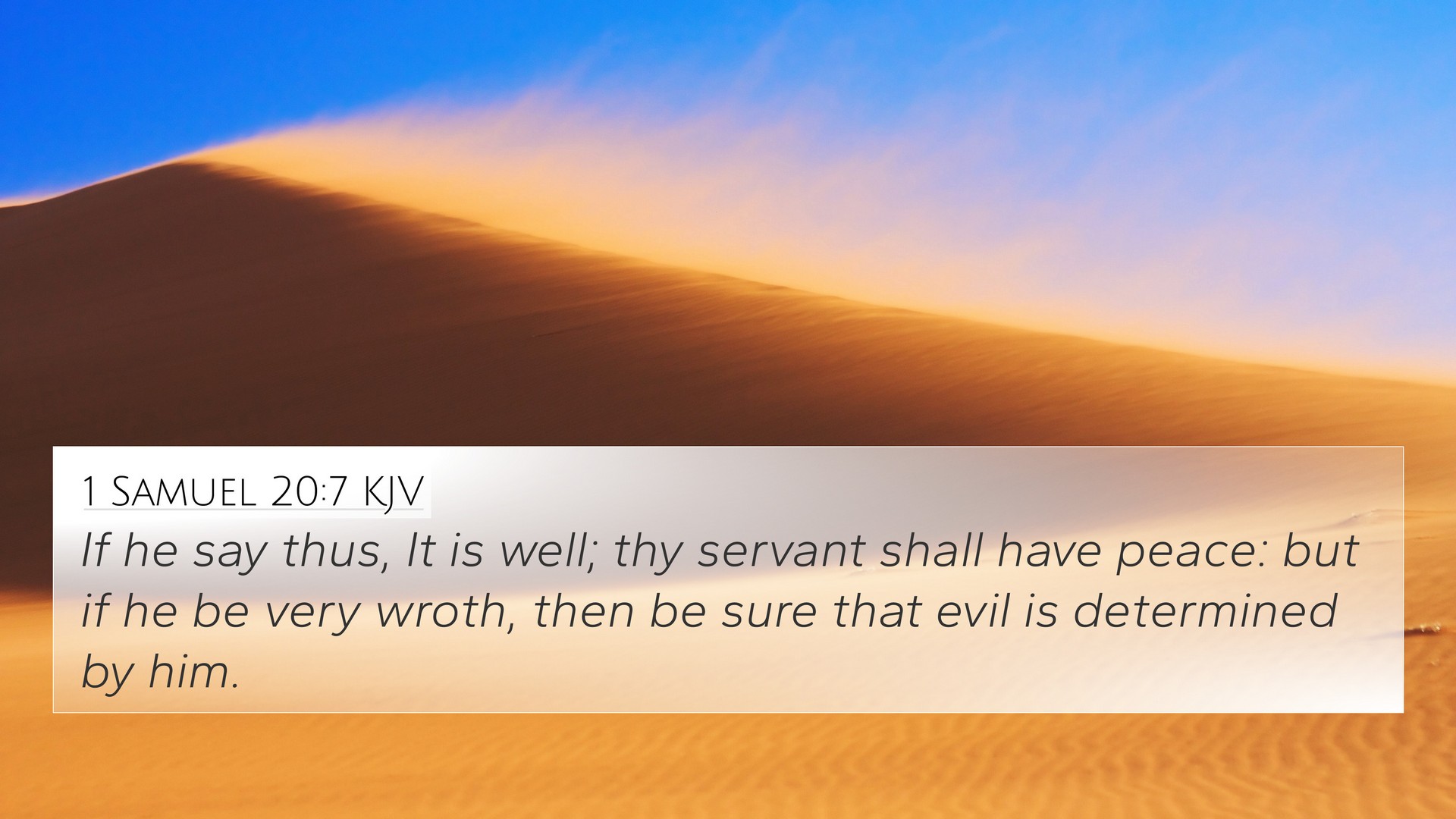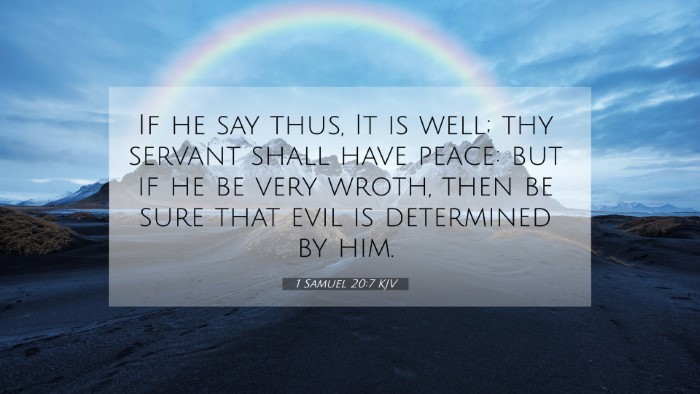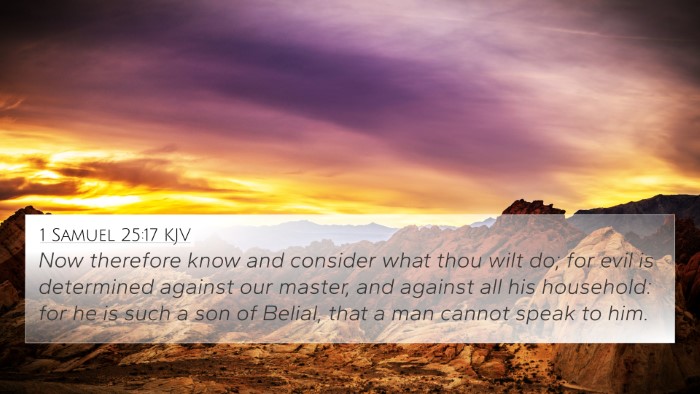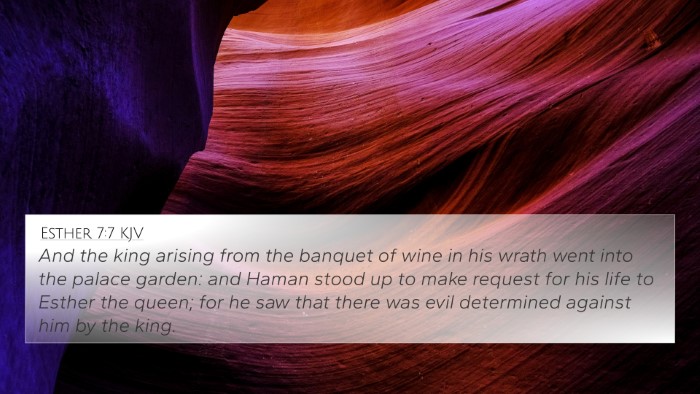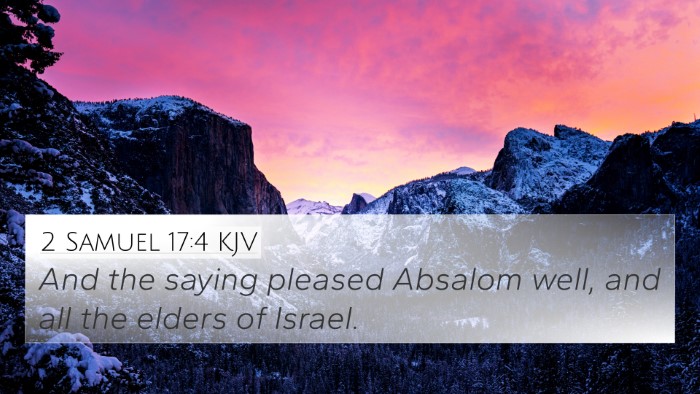Understanding 1 Samuel 20:7
The verse 1 Samuel 20:7 states: "If he says, ‘Good,’ it means peace to your servant; but if he is angry, then be sure that evil is determined by him." This verse unfolds layers of relational dynamics and the importance of discernment in human interactions, which can be enriched through various public domain commentaries. Below is a detailed analysis based on insights from Matthew Henry, Albert Barnes, and Adam Clarke.
Contextual Overview
This verse occurs within a tense moment between David and Jonathan amidst King Saul's growing hostility towards David. Jonathan, Saul’s son, is loyal to David but must navigate his father's wrath. This situation highlights the complexities of loyalty, friendship, and the challenges of political intrigue.
Insights from Public Domain Commentaries
- Matthew Henry: Henry emphasizes the theme of friendship and loyalty found in this passage. He notes that Jonathan's concern showcases his deep commitment to David and his role as a peacemaker. The verse underlines Jonathan's ability to interpret his father's mood as indicative of a broader relational tension. This necessity of discernment in relationships is critical for navigating the complexities of close ties.
- Albert Barnes: Barnes expounds on the implications of Saul's potential reactions. He highlights the dichotomy of good and evil represented in Saul's response, reflecting the caution one must exercise when dealing with volatile relationships. This commentary underscores the need for vigilance in understanding others' intentions, especially those who hold power.
- Adam Clarke: Clarke points out that the emotional climate of the relationships is pivotal here. He notes that Jonathan's insights into his father’s moods illustrate not just affection but an inherent wisdom in assessing character and intent. Clarke's analysis invites readers to contemplate the broader implications of interpersonal discernment and the sometimes painful decisions it may prompt.
Thematic Connections and Cross-References
1 Samuel 20:7 stands as a marker of the importance of understanding varying human motives and the discernment necessary for peacekeeping. Several other Bible verses resonate with this theme, reinforcing the complex dynamics of trust and understanding in relationships:
- Proverbs 17:17: "A friend loves at all times, and a brother is born for a time of adversity." This underscores the value of steadfast friendship.
- 1 Chronicles 12:33: The sons of Issachar understood the times and knew what Israel should do, highlighting the need for insight in leadership.
- James 1:5: "If any of you lacks wisdom, let him ask of God, who gives to all liberally and without reproach." This aligns with the theme of seeking divine guidance in understanding people.
- Lamentations 3:40: "Let us test and examine our ways, and return to the Lord!" This reflects self-examination and discernment essential in relationships.
- Matthew 10:16: "Behold, I am sending you out as sheep in the midst of wolves, so be wise as serpents and innocent as doves." This verse advises caution in hostile environments.
- Romans 12:10: "Love one another with brotherly affection. Outdo one another in showing honor." This demonstrates the foundational principle of love in unity.
- Philippians 1:9-10: "And it is my prayer that your love may abound more and more, with knowledge and all discernment, so that you may approve what is excellent." The call for discernment is integral to growing relationships.
Application of Cross-Referencing
Understanding the connections between Bible verses such as 1 Samuel 20:7 and the references listed above can enhance one’s Bible study. Here are several tools for Bible cross-referencing that can facilitate this process:
- Utilizing a Bible concordance to find related verses can lead deeper into themes of friendship and wisdom.
- Employing a Bible cross-reference guide during personal study can reveal additional insights and connections.
- Engaging in cross-reference Bible study allows for thematic exploration across both the Old and New Testaments.
- Understanding how to use Bible cross-references can aid in identifying links between different scriptural narratives.
- Applying cross-referencing Bible study methods helps in drawing parallels between diverse texts.
Conclusion
In summary, 1 Samuel 20:7 serves as a profound reminder of the complexities of human relationships and the wisdom required to navigate them. Through the insights gleaned from esteemed commentaries and the cross-referencing of relevant scriptures, one can appreciate the intricate web of themes that connect this verse to broader biblical principles. The examination of relational dynamics, loyalty, and discernment contributes to a meaningful understanding of biblical texts and their application in everyday life.
